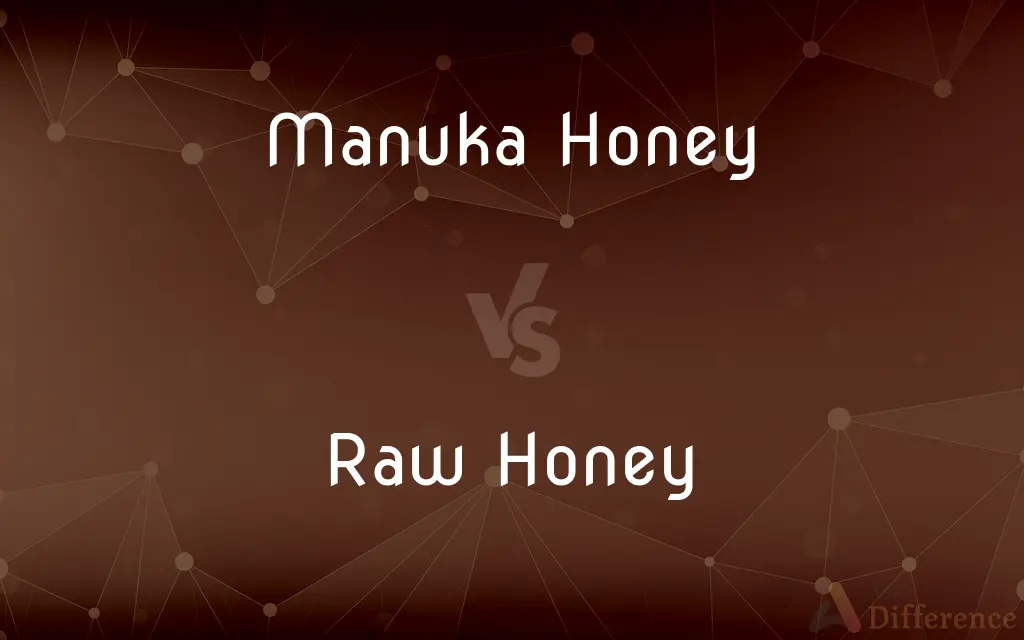Manuka Honey vs. Raw Honey — What's the Difference?
By Fiza Rafique & Urooj Arif — Published on August 1, 2024
Manuka honey, known for its unique antibacterial properties, is sourced from New Zealand's manuka tree, while raw honey is unprocessed honey from various plants, retaining natural nutrients.

Difference Between Manuka Honey and Raw Honey
Table of Contents
ADVERTISEMENT
Key Differences
Manuka honey is prized for its high methylglyoxal (MGO) content, which contributes to its strong antibacterial effects, making it unique among honey varieties. Originating from the nectar of the manuka tree found in New Zealand, this honey has gained international acclaim for its potential health benefits. On the other hand, raw honey refers to honey that has not been heated or pasteurized, preserving its natural enzymes, vitamins, and minerals. Raw honey can come from any floral source, resulting in a diverse range of flavors, colors, and nutritional profiles based on the flowers visited by the bees.
The antibacterial strength of manuka honey is often rated by a Unique Manuka Factor (UMF) or MGO level, with higher numbers indicating greater antibacterial potency. This makes manuka honey particularly sought after for medicinal uses, including wound healing and soothing sore throats. Raw honey, while also having antibacterial properties due to hydrogen peroxide and its acidic pH, does not contain the specific compounds that give manuka honey its extra antibacterial punch.
In terms of nutritional value, both manuka and raw honey offer antioxidants, but manuka honey's unique antioxidant compounds like leptosperin may provide additional health benefits. Raw honey's nutritional content can vary widely depending on the floral sources, with certain types also boasting specific health-enhancing properties.
Price-wise, manuka honey is generally more expensive due to its unique properties, limited supply, and the stringent testing it undergoes to verify its authenticity and potency. Raw honey can be more affordable and accessible, offering a broader range of tastes and benefits depending on the variety.
Both types of honey should be consumed in moderation as part of a balanced diet, and it's important to note that honey, in general, is not recommended for infants under one year old due to the risk of botulism.
ADVERTISEMENT
Comparison Chart
Source
Nectar from New Zealand's manuka tree
Various plants' nectar, depending on the floral source
Antibacterial Level
High, due to MGO and UMF ratings
Variable, generally lower than manuka
Nutritional Value
Rich in antioxidants, with unique compounds like leptosperin
Varies by floral source, generally rich in natural enzymes and nutrients
Price
Generally more expensive due to unique properties and testing
More affordable, varies with floral source
Medicinal Use
Highly valued for wound healing, soothing sore throats
Used for general wellness, with varying health benefits
Taste
Distinctive, earthy, and more robust
Varies widely, generally sweeter and milder
Compare with Definitions
Manuka Honey
Rated by UMF or MGO levels, indicating its potency.
The jar of manuka honey had a UMF rating of 15+.
Raw Honey
Comes from various floral sources, affecting its taste and properties.
The raw honey from lavender flowers had a subtle floral note.
Manuka Honey
Often more expensive due to its unique characteristics.
The high price of manuka honey reflects its medicinal qualities.
Raw Honey
More affordable and accessible than specialty honeys.
They chose raw honey for its affordability and healthful qualities.
Manuka Honey
Honey with unique antibacterial properties, sourced from the manuka tree.
She applied manuka honey on her wound for its healing properties.
Raw Honey
Offers a diverse range of flavors and benefits.
The market's selection of raw honey varied in color and taste, each with unique benefits.
Manuka Honey
Sought after for specific health applications.
Manuka honey is popular for treating sore throats and digestive issues.
Raw Honey
Contains natural antibacterial properties, beneficial for health.
Raw honey was used in his homemade remedies for its antibacterial effects.
Manuka Honey
Known for its distinctive taste and therapeutic benefits.
He added manuka honey to his tea for its health benefits.
Raw Honey
Unprocessed honey, preserving natural nutrients and enzymes.
She preferred raw honey for its natural flavor and health benefits.
Common Curiosities
What makes manuka honey different from regular honey?
Manuka honey contains unique antibacterial compounds like MGO, not found in regular honey, and is sourced specifically from the manuka tree in New Zealand.
Can I use any raw honey for wounds like manuka honey?
While raw honey has general antibacterial properties, manuka honey is specifically sought after for wound healing due to its higher antibacterial potency.
How do I know if my manuka honey is genuine?
Look for UMF or MGO ratings on the label, which are indicators of its authenticity and antibacterial strength.
Is manuka honey worth the price?
For those seeking its specific antibacterial benefits for health issues, manuka honey may be worth the investment.
Is raw honey safe to eat?
Yes, for most people, except infants under one year due to the risk of botulism.
Why is manuka honey so expensive?
Its unique antibacterial properties, limited geographical source, and the stringent testing for authenticity contribute to its high price.
Can raw honey help with allergies?
Some people believe local raw honey can help with seasonal allergies by exposing the immune system to local pollen, but scientific evidence is limited.
Can diabetics consume manuka or raw honey?
While honey is natural, it's high in sugars and should be consumed in moderation, especially by diabetics.
How should I store manuka and raw honey?
Both should be stored in a cool, dark place to maintain their properties.
Can I use manuka honey in cooking?
Yes, but high heat may reduce its beneficial properties.
Are there fake manuka honey products?
Yes, due to its value, there are imitations, so it's important to buy from reputable sources.
Is all raw honey organic?
Not necessarily; it depends on the practices of the area where the bees collect nectar.
Can raw honey turn into manuka honey if bees are near manuka plants?
Bees need to primarily collect nectar from manuka flowers for the honey to be considered manuka, with specific testing for its unique properties.
Does the taste of honey affect its antibacterial properties?
The taste doesn't directly correlate with antibacterial properties; these depend more on the honey's source and processing.
How long does manuka honey last?
When stored properly, it can last for years without losing its potency.
Share Your Discovery

Previous Comparison
Methanoic Acid vs. Ethanoic Acid
Next Comparison
Laminar Flow vs. Turbulent FlowAuthor Spotlight
Written by
Fiza RafiqueFiza Rafique is a skilled content writer at AskDifference.com, where she meticulously refines and enhances written pieces. Drawing from her vast editorial expertise, Fiza ensures clarity, accuracy, and precision in every article. Passionate about language, she continually seeks to elevate the quality of content for readers worldwide.
Co-written by
Urooj ArifUrooj is a skilled content writer at Ask Difference, known for her exceptional ability to simplify complex topics into engaging and informative content. With a passion for research and a flair for clear, concise writing, she consistently delivers articles that resonate with our diverse audience.













































